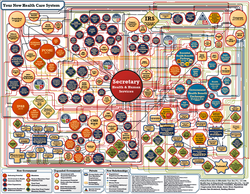Cronysim and Obama Care!

If the Obama Care bill is so great for Americans, than why has the Obama administration handed out more than 1200 exemptions? The real question is to whom did those exemptions go? To business's who are his big donor's that's who! This will ultimately cost the American taxpayers a great deal of additional monies for their coverage. Remember it's not what you know but who you know! READ MORE
|
Medicare Advantage - Whose Advantage?

When the 2,700 page bill was thrown together, there were oversights. Under federal "open enrollment" guidelines, seniors must pick their Medicare coverage program for next year before the end of this year. Open enrollment begins Oct. 15, 2012. The bill seeks to end MEDICARE ADVANTAGE!
So in choosing Medicare Advantage in October 2012 that will set Americans up to have no insurance at all in 2013. I KEEP TRYING TO REMIND EVERYONE THE THINGS BEING DONE BY THIS ADMINISTRATION ARE NOT JUST FOR REPUBLICANS, DEMOCRATS, INDEPENDENTS, BLACK, WHITE, YELLOW, RED, OR GREEN! THEY ARE FOR EVERYONE! People forget this when they think THEIR party is putting the screws to the other side! Wake Up! This has the potential to mean the 12 million seniors enrolled in Medicare Advantage will be angry with Democrats when they enter the voting booth. Since most of them live in swing states, this could have unpleasant consequences for Barack Hussein Obama's re-election prospects. So he plans to spend $8 billion of OUR money to keep most from finding out until after the election. How will he do this you ask? Well, he will try to not have you find out about it, but he intends to take the money from funds set aside for "demonstration projects" for which specific Congressional approval is NOT required. The Congress will never approve a request for $8 billion for a publicity project to dim the above facts and this is more than what the Department of Health and Human Services has spent on all previous Medicare "demonstration projects" combined, and would serve no scientific purpose, said the Government Accountability Office in a scathing report. A recent reminder of the increase in student loan interest rates, effective on July 1 for loans obtained AFTER that date. Mr. Romney dashed plans to use this as a wedge issue when he said he'd support the subsidy if its $6 billion cost were offset elsewhere. On Friday (4/27), House Republicans passed a bill to take the money from the HHS "demonstration project" slush fund. There is justice in that, because the HHS slush fund was created in the first place when the Democrat Congress in 2010 diverted $9 billion in student loan funding to it. This puts Senate Democrats on the spot. They want to defer the loan rate hike, but have as great an interest as does Mr. Obama in concealing the truth about Medicare Advantage. They could pass the student loan subsidy without an offset, but that would cast another spotlight on their fiscal irresponsibility. So they propose to pay for it by raising taxes on small business. Republicans won't support this, so Congress may pass nothing before the July 1 deadline. Democrats have more to lose from a standoff. This abuse of the law may be undone by the Republican response to another of Mr. Obama's efforts to buy votes with our dollars. |
FIVE THINGS THEY DON'T WANT YOU TO KNOW! JUST SIGN - THEN READ!

How many Gov. Agencies are involved?
1. Section 3403 of the Senate health bill, establishing a commission to cut Medicare spending, states the law can't be changed or repealed in the future. This whopper shows that Congress thinks its work should be set in stone. Wrong. The people always have the right to elect a new Congress to change or repeal what a previous Congress has done. Helps to read a bill!
2. A Senate health-bill amendment mysteriously allocates $100 million to an unnamed facility that "shall be affiliated with an academic health center at a public research university in the United States that contains a state's sole public academic medical and dental school" (Sec. 10502, p. 328-329). Why not name the facility? Well because, This PORK deal was arranged by Sen. Chris Dodd for the University of Connecticut Health Center, although 11 hospitals in the nation technically meet these same specifications. If Congress wrote the provision in Polish or Russian to keep the public in the dark, it would be unconstitutional. The language is a deception. The fact that legislators commonly do this makes it more damaging, not less so.
3. The bill requires you to enroll in a "qualified health plan," whether you want it or not. Forcing people to buy insurance obviously reduces the number of uninsured. But Congress doesn't have the authority to force people to buy a product. Sen. Orin Hatch (R-Nev.) said as much on the Senate floor, "If Congress may require individuals to purchase a particular good or service we could simply require that Americans buy certain cars - for that matter, we could attack the problem of obesity by requiring Americans to buy fruits and vegetables."
4. Never before has the federal government intruded into decisions made by doctors for privately insured patients, except on narrow issues such as drug safety. Nothing in the Constitution permits it, but the Senate bill makes you enroll in a plan and then says that only doctors who do what the government dictates can be paid by your plan.
"Qualified plans" can contract only with a doctor who "implements such mechanisms to improve health-care quality as the [current or future] secretary [of Health and Human Services] may by regulation require" (Sec. 1311, p. 148-49). That covers all of medicine, from heart care to child birth, stents to mammograms.
5. Finally, the "takings clause" of the Fifth Amendment bars government from taking your property without compensation. It should protect everyone, no matter how unpopular -- even insurance companies, but Congress ignored it in writing the health bill. The Senate version goes beyond reining in insurance-company abuses, a just cause, and actually caps insurance-company profit margins at well below current levels, robbing shareholders.
Some Congressional members claim the "general welfare clause" of the Constitution empowers them to impose a mandate, but they're taking the phrase out of context. The Constitution gives Congress power to tax and spend for the general welfare, but not to make other kinds of laws for the general welfare. The Senate bill (pages 320-324) claims the "interstate commerce" clause of the Constitution gives Congress this authority, but for half a century, states have regulated health insurance. In fact, individuals are barred from buying insurance in any state except where they live, the antithesis of interstate commerce.
Congressional majorities have frequently resorted to the commerce clause to justify their lawmaking. In FDR's first term, Congress cited it to pass the National Industrial Recovery Act, which gave the federal government power to micromanage local businesses, setting wages and hours and even barring customers from selecting their live chickens at the butcher. Two Brooklyn brothers, owners of Schechter Poultry Corp., a kosher chicken business, challenged that interference. In 1935, the US Supreme Court ruled the NIRA unconstitutional.
In 1995, the high court again admonished Congress against using the commerce clause as a basis for expanded lawmaking, even when the purpose is as worthy as keeping handguns out of a school zone (US v. Lopez). The court ruled that Congress must stick to its enumerated powers and leave states to police school zones (and, perhaps, mandate health insurance).
2. A Senate health-bill amendment mysteriously allocates $100 million to an unnamed facility that "shall be affiliated with an academic health center at a public research university in the United States that contains a state's sole public academic medical and dental school" (Sec. 10502, p. 328-329). Why not name the facility? Well because, This PORK deal was arranged by Sen. Chris Dodd for the University of Connecticut Health Center, although 11 hospitals in the nation technically meet these same specifications. If Congress wrote the provision in Polish or Russian to keep the public in the dark, it would be unconstitutional. The language is a deception. The fact that legislators commonly do this makes it more damaging, not less so.
3. The bill requires you to enroll in a "qualified health plan," whether you want it or not. Forcing people to buy insurance obviously reduces the number of uninsured. But Congress doesn't have the authority to force people to buy a product. Sen. Orin Hatch (R-Nev.) said as much on the Senate floor, "If Congress may require individuals to purchase a particular good or service we could simply require that Americans buy certain cars - for that matter, we could attack the problem of obesity by requiring Americans to buy fruits and vegetables."
4. Never before has the federal government intruded into decisions made by doctors for privately insured patients, except on narrow issues such as drug safety. Nothing in the Constitution permits it, but the Senate bill makes you enroll in a plan and then says that only doctors who do what the government dictates can be paid by your plan.
"Qualified plans" can contract only with a doctor who "implements such mechanisms to improve health-care quality as the [current or future] secretary [of Health and Human Services] may by regulation require" (Sec. 1311, p. 148-49). That covers all of medicine, from heart care to child birth, stents to mammograms.
5. Finally, the "takings clause" of the Fifth Amendment bars government from taking your property without compensation. It should protect everyone, no matter how unpopular -- even insurance companies, but Congress ignored it in writing the health bill. The Senate version goes beyond reining in insurance-company abuses, a just cause, and actually caps insurance-company profit margins at well below current levels, robbing shareholders.
Some Congressional members claim the "general welfare clause" of the Constitution empowers them to impose a mandate, but they're taking the phrase out of context. The Constitution gives Congress power to tax and spend for the general welfare, but not to make other kinds of laws for the general welfare. The Senate bill (pages 320-324) claims the "interstate commerce" clause of the Constitution gives Congress this authority, but for half a century, states have regulated health insurance. In fact, individuals are barred from buying insurance in any state except where they live, the antithesis of interstate commerce.
Congressional majorities have frequently resorted to the commerce clause to justify their lawmaking. In FDR's first term, Congress cited it to pass the National Industrial Recovery Act, which gave the federal government power to micromanage local businesses, setting wages and hours and even barring customers from selecting their live chickens at the butcher. Two Brooklyn brothers, owners of Schechter Poultry Corp., a kosher chicken business, challenged that interference. In 1935, the US Supreme Court ruled the NIRA unconstitutional.
In 1995, the high court again admonished Congress against using the commerce clause as a basis for expanded lawmaking, even when the purpose is as worthy as keeping handguns out of a school zone (US v. Lopez). The court ruled that Congress must stick to its enumerated powers and leave states to police school zones (and, perhaps, mandate health insurance).
